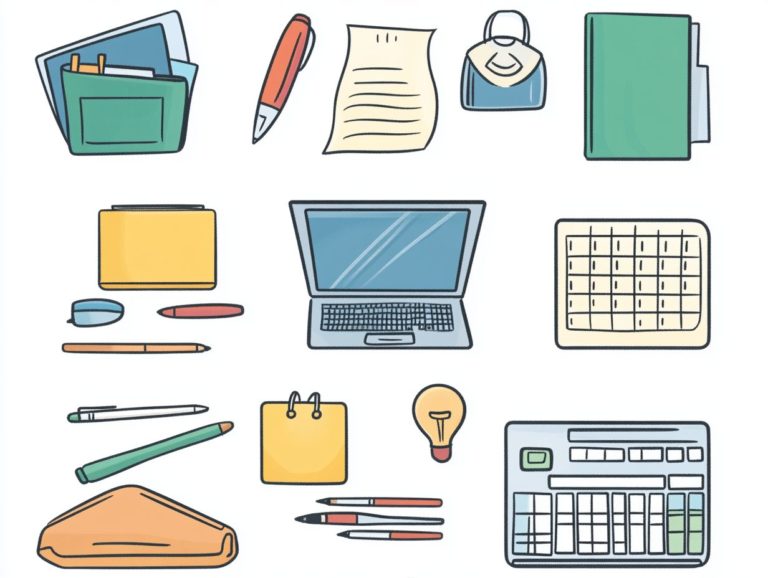Essential Tax Documents Every Freelancer Should Keep
Navigating the world of taxes can feel overwhelming for freelancers, yet grasping your obligations is essential for achieving financial success as a self-employed individual.
This article carefully looks at the vital tax documents you need, provides insightful tips on tracking your income and expenses, and emphasizes the significance of tax deductions and credits.
It also outlines important tax filing deadlines to help you evade penalties, shares strategies for a more seamless preparation process, and explores the advantages of collaborating with a tax professional who understands the complexities of freelancer income tax.
Stay informed and unlock your potential! You can maximize your earnings as a freelancer today!
Contents
- Key Takeaways:
- Important Tax Documents for Freelancers
- Tracking Income and Expenses
- Understanding Deductions and Credits
- Tax Filing and Payment Deadlines
- Tax Preparation Tips for Freelancers
- Working with a Tax Professional
- Frequently Asked Questions
- What are essential tax documents that every freelancer should keep?
- Why is it important for freelancers to keep these tax documents?
- Where can freelancers obtain 1099-MISC forms?
- What should freelancers do if they are missing a tax document?
- How long should freelancers keep these tax documents?
- Are there any tools or software that can help freelancers keep track of these tax documents?
Key Takeaways:
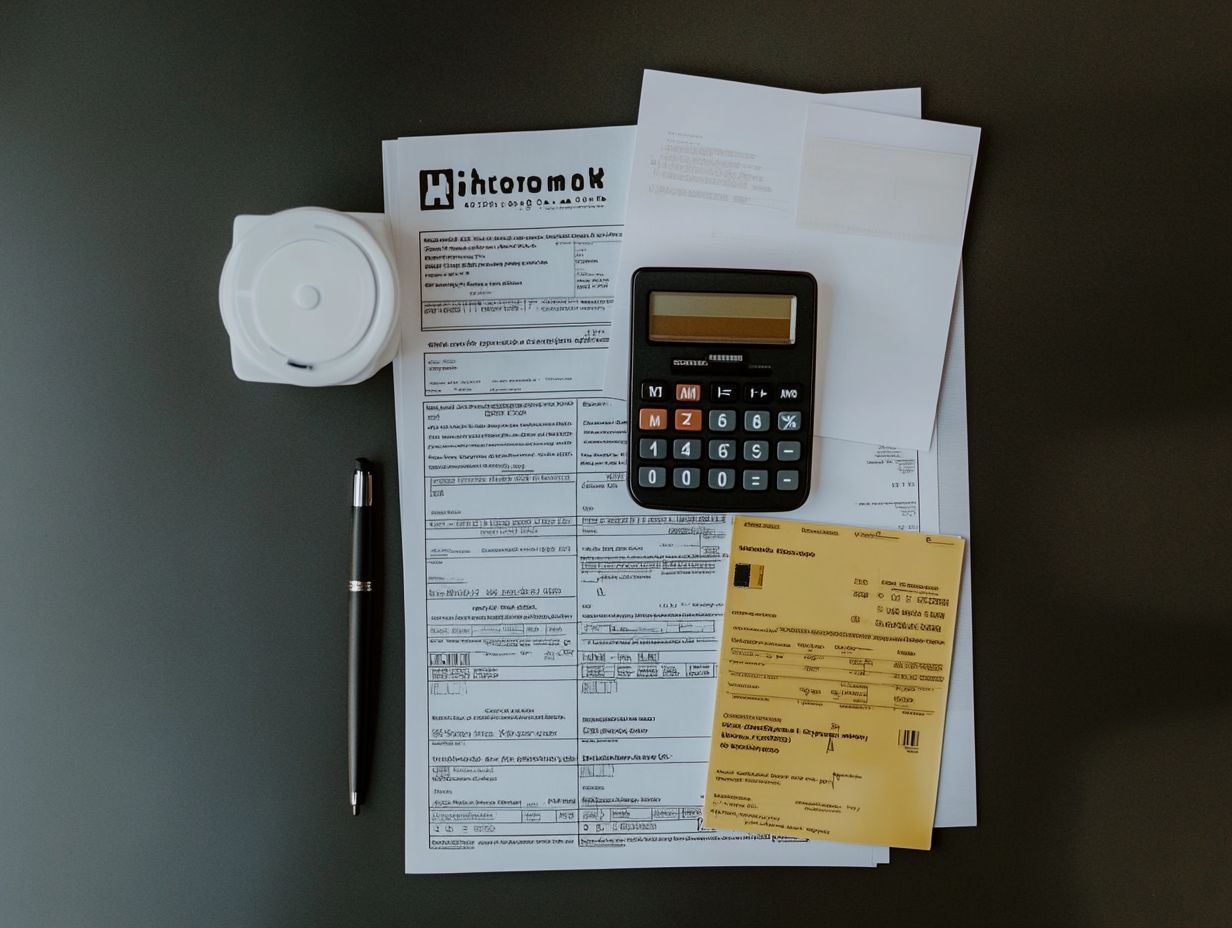
- Keep track of all income and expenses to accurately report earnings and maximize tax savings.
- Organize and retain essential documents such as receipts, invoices, and tax forms to ensure a smooth tax filing process.
- Consider working with a tax professional to navigate the complexities of tax obligations and potentially save time and money.
Understanding Tax Obligations for Freelancers
Freelancers have unique tax obligations that set them apart from traditional employees, primarily because they re self-employed and earn contractor income. Understanding these obligations is essential for effectively managing your tax liability.
This complexity requires you to navigate various tax forms and regulations. Timely filing and paying estimated taxes, often calculated quarterly, are crucial.
You also need to stay vigilant about the income tax responsibilities that arise from your freelance work. Keeping accurate records, claiming tax deductions, and preparing for self-employment tax obligations are critical.
Prepare for self-employment taxes, as they include Social Security and Medicare contributions, which aren t automatically withheld like in traditional jobs. Familiarizing yourself with important IRS forms, such as the 1099-K, is vital.
This form tracks payment card transactions and third-party network transactions, including those from PayPal and Venmo. Depending on the state in which you operate, you may encounter specific regulations and tax requirements that vary significantly.
By maintaining meticulous financial records, you can navigate your tax obligations with greater ease. This allows you to proactively manage your overall tax responsibilities and reduce stress during tax season.
Important Tax Documents for Freelancers
As a freelancer, it’s essential for you to be meticulous in managing several crucial tax documents to ensure compliance with IRS regulations and enhance your tax filing experience.
Among these key documents is the 1099-K, which reports your contractor income from platforms such as PayPal and Venmo.
Maintaining thorough records of your tax deductions can significantly lower your overall income tax liability. Leveraging tax software like TurboTax can simplify this entire process, offering you guidance on the necessary documentation and empowering you to maximize your deductions effectively.
Overview of Essential Documents
Essential documents for freelancers include IRS forms, with the 1099-K standing out as particularly important for reporting income from various payment platforms, ensuring compliance with IRS regulations. Keeping careful track of all income and expenses is crucial for effective expense management, which significantly impacts your tax deductions and income tax calculations.
By accurately documenting your business expenses, you can maximize your tax deductions and minimize your taxable income. This is crucial for maintaining your financial health.
Beyond IRS forms, you should maintain a variety of essential documents, including invoices sent to clients, receipts for purchases, and bank statements that reflect your financial transactions. Any letters from the IRS are also worth saving for future reference. Organizing these documents efficiently is vital to ensure that nothing slips through the cracks during tax season. Understanding the importance of keeping tax records for freelancers can further aid in maintaining your financial health.
Consider utilizing tools like Veryfi OCR to streamline this entire process of expense management. By digitizing and categorizing your paperwork, you ll have critical information at your fingertips and can maintain comprehensive records without the clutter.
Tracking Income and Expenses
Tracking your income and expenses is an essential element of freelance work that profoundly influences your financial health and tax responsibilities. By meticulously documenting all contractor income and business expenses, you can adeptly manage your finances and optimize the tax deductions available to you.
This includes the home office deduction, which permits you to deduct a portion of your housing costs if you use a part of your home exclusively for business purposes. It’s vital to ensure you categorize your expenses as ordinary and necessary, paving the way for a more favorable financial outlook.
Organizing Receipts and Invoices
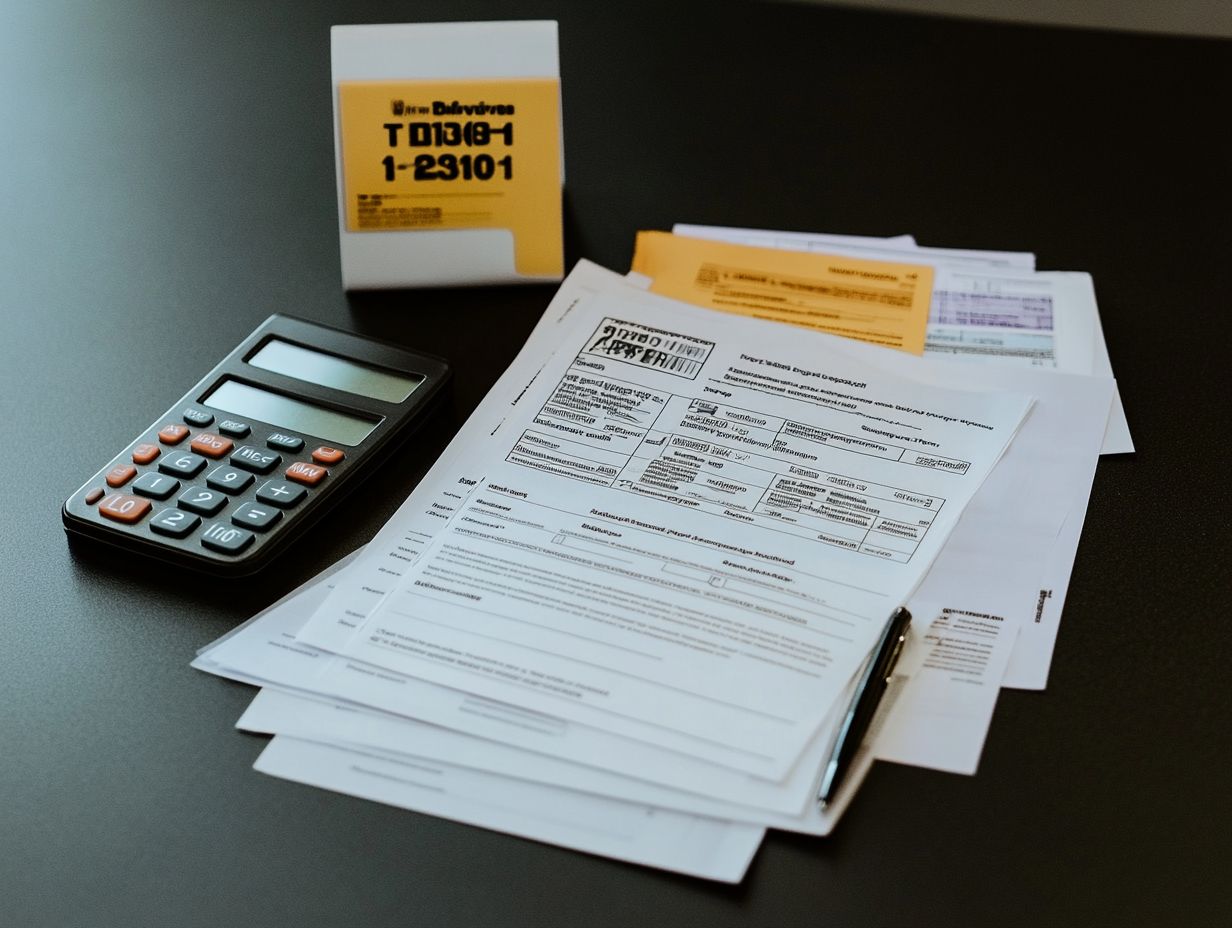
Keeping your receipts and invoices organized is crucial for freelancers aiming to maintain precise financial records and streamline tax preparation. By harnessing tools like Veryfi OCR, you can effortlessly digitize your receipts and invoices, ensuring that all essential documents are readily accessible in case of an audit or when it s time to file your taxes. This level of organization not only simplifies expense management but also enhances your overall financial clarity.
To elevate this process, consider categorizing your receipts and invoices by expense types think travel, supplies, and services. This thoughtful categorization makes it far easier to locate specific documents when you need them.
Reviewing these records regularly helps keep everything in order and offers valuable insights into your spending habits, giving you the power to make more informed financial decisions.
Keeping your financial records up-to-date on a regular basis, ideally weekly, helps you avoid the dreaded last-minute scramble as tax season approaches, particularly as you manage your estimated taxes. Utilizing cloud-based platforms and accounting software enables automatic syncing and reminders, making it simpler to stay organized.
Understanding Deductions and Credits
Grasping the nuances of tax deductions and credits is essential for freelancers who seek to minimize their taxable income and enhance their tax returns, ultimately improving their financial position.
Among the key deductions are those tied to self-employment tax, which is the tax freelancers pay on their income, helping fund Social Security and Medicare. This includes significant expenses such as the home office deduction and other ordinary, necessary costs associated with your freelance endeavors.
By meticulously identifying and claiming these deductions, you can substantially reduce your income tax liability and elevate your financial position.
Take charge of your finances today and start maximizing your deductions!
Maximizing Tax Savings
Maximizing your tax savings should be a top priority as a freelancer. It allows you to keep more of your hard-earned income and effectively manage your tax liability.
To achieve this, it’s essential to familiarize yourself with the available tax deductions, such as the home office deduction. This can significantly lower your taxable income and support your professional development.
Understanding the intricacies of self-employment tax, which is what you pay for Social Security and Medicare when you’re self-employed, will help you uncover further savings opportunities.
Enhancing your tax strategies is as simple as meticulously documenting all work-related expenses throughout the year, from travel costs to software subscriptions. Utilizing reliable tax software can streamline this process, making it easier for you to track your income and deductions.
By planning ahead for estimated taxes, you can avoid penalties and manage your cash flow more effectively.
You should consult with tax professionals who can offer tailored advice and help you uncover additional deductions specific to your business. This is especially important for freelancers in Maryland, Massachusetts, Vermont, Virginia, North Carolina, and Montana. They can also ensure you remain compliant with the latest IRS regulations. This approach will ultimately help you save more money.
Tax Filing and Payment Deadlines
As a freelancer, it’s crucial for you to stay acutely aware of tax filing and payment deadlines. Making quarterly payments is essential to sidestep penalties and manage your tax liability with precision.
The IRS typically expects self-employed individuals to make estimated tax payments quarterly, helping you fulfill your income tax obligations punctually.
Missing these deadlines can lead to interest charges and penalties, highlighting the importance of proactive tax planning in your financial strategy.
Avoiding Penalties and Interest
Avoiding penalties and interest is essential for maintaining your financial health and staying compliant with IRS regulations. Pay your estimated taxes on time to avoid costly interest!
When you grasp the consequences of missed deadlines, it can inspire you to stay organized and proactive. This ensures you meet your obligations and fulfill your freelance work commitments.
One common pitfall you might encounter as a freelancer is the failure to file or pay your taxes on time, which can result in substantial fines. The IRS has a knack for imposing penalties if you underestimate your tax payments, adding unnecessary stress to your financial situation.
To steer clear of these issues, prioritize keeping accurate financial records. Consider using tax software that provides reminders for important deadlines. If you find yourself in unavoidable circumstances that hinder timely submissions, don t hesitate to reach out to the IRS or take advantage of their payment plans. This proactive approach not only eases the burden but also helps ensure your compliance in the future.
Tax Preparation Tips for Freelancers
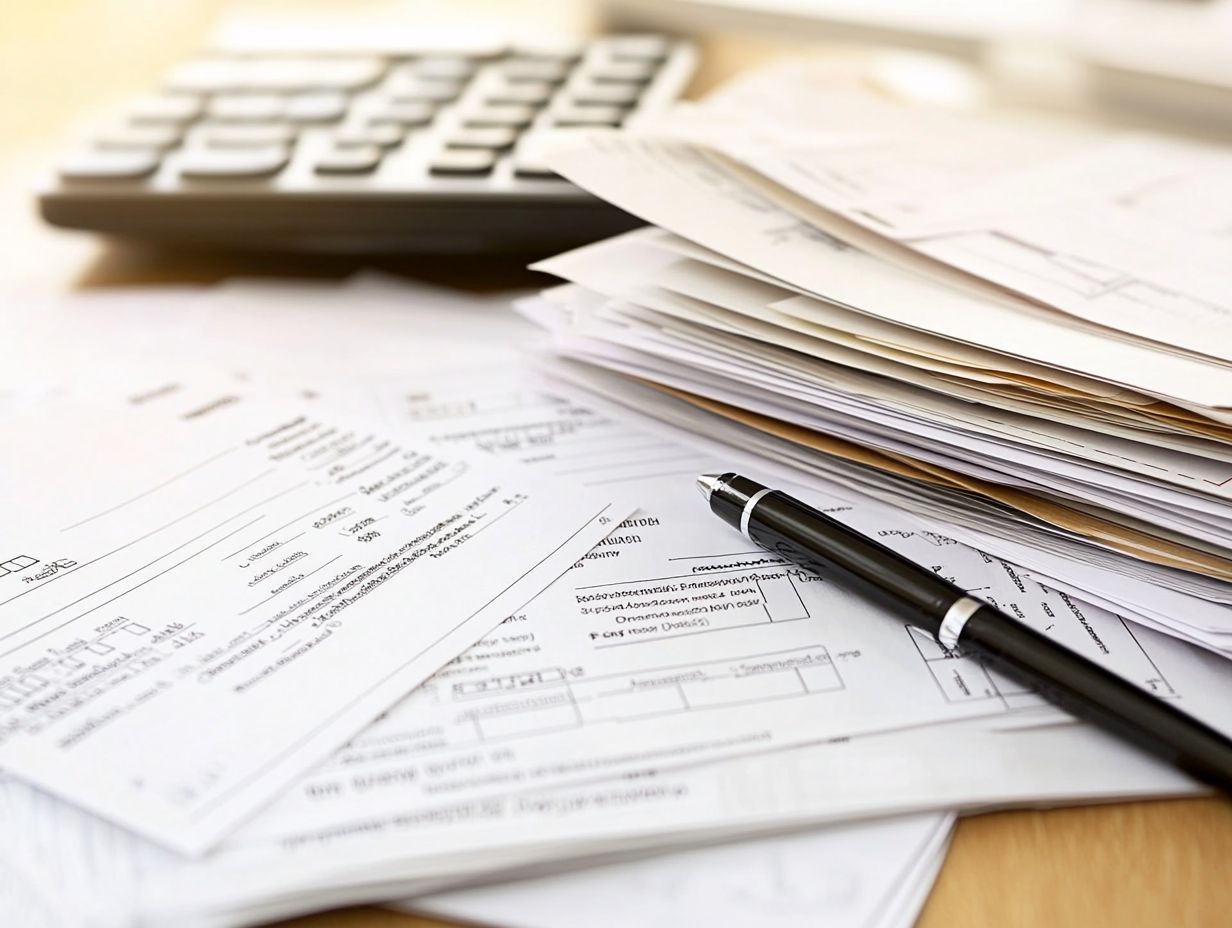
Effective tax preparation is crucial for freelancers like you to navigate the complexities of self-employment and maintain compliance with IRS regulations.
By utilizing tax software specifically designed for freelancers, you can streamline your filing process, manage expenses with finesse, and stay organized throughout the year.
Investing in professional development focused on tax preparation can deepen your understanding and significantly enhance your overall financial outcomes.
Strategies for Simplifying the Process
Implementing effective strategies for simplifying your tax preparation process can significantly alleviate stress and enhance your experience as a freelancer. By utilizing tax software like Veryfi, you can automate expense management and streamline documentation. This allows you to focus on your creative pursuits instead of getting bogged down by tax-related tasks.
Regularly updating your financial records throughout the year is essential for ensuring a smoother filing process when tax season arrives. Consider setting aside dedicated time for record-keeping perhaps a few hours each week to categorize receipts and update spreadsheets.
Embracing financial tools like QuickBooks or FreshBooks can also help you track your income and expenses effectively. This makes it much easier to generate reports when needed.
Creating a consistent routine for managing your finances, such as designating specific days to review transactions or utilizing automated reminders, can greatly enhance your overall efficiency. By integrating these practices, you can better prepare for tax season and minimize the headaches typically associated with it.
Working with a Tax Professional
Engaging with a tax professional offers invaluable support as you navigate the intricacies of tax preparation and comply with IRS regulations. A qualified expert has the knowledge to identify relevant tax deductions and understands the taxes you owe as a freelancer.
This collaboration enables you to develop effective plans for managing your taxes, alleviating the weight of your tax obligations and leading to a more favorable financial outcome.
Benefits and Considerations
The advantages of collaborating with a tax professional for freelancers are plentiful. They provide expert knowledge in tax preparation along with tailored strategies that maximize your tax deductions.
By engaging a tax professional, you can gain a clearer understanding of your income tax obligations and the intricacies of self-employment tax. It s essential to consider factors like cost and the importance of clear communication when selecting the right tax professional for your needs.
A tax professional is especially helpful during audits. Their expertise offers reassurance and strategic guidance, assisting you with hard-to-claim expenses related to home offices, equipment purchases, and travel costs, ensuring that no potential savings slip through the cracks.
While these benefits are clear, it s crucial to weigh the financial investment of hiring a tax professional against the potential savings. Establishing a solid working relationship is key; effective communication helps you feel confident and informed about your tax strategies, leading to a smoother and more efficient tax season overall.
Frequently Asked Questions
What are essential tax documents that every freelancer should keep?
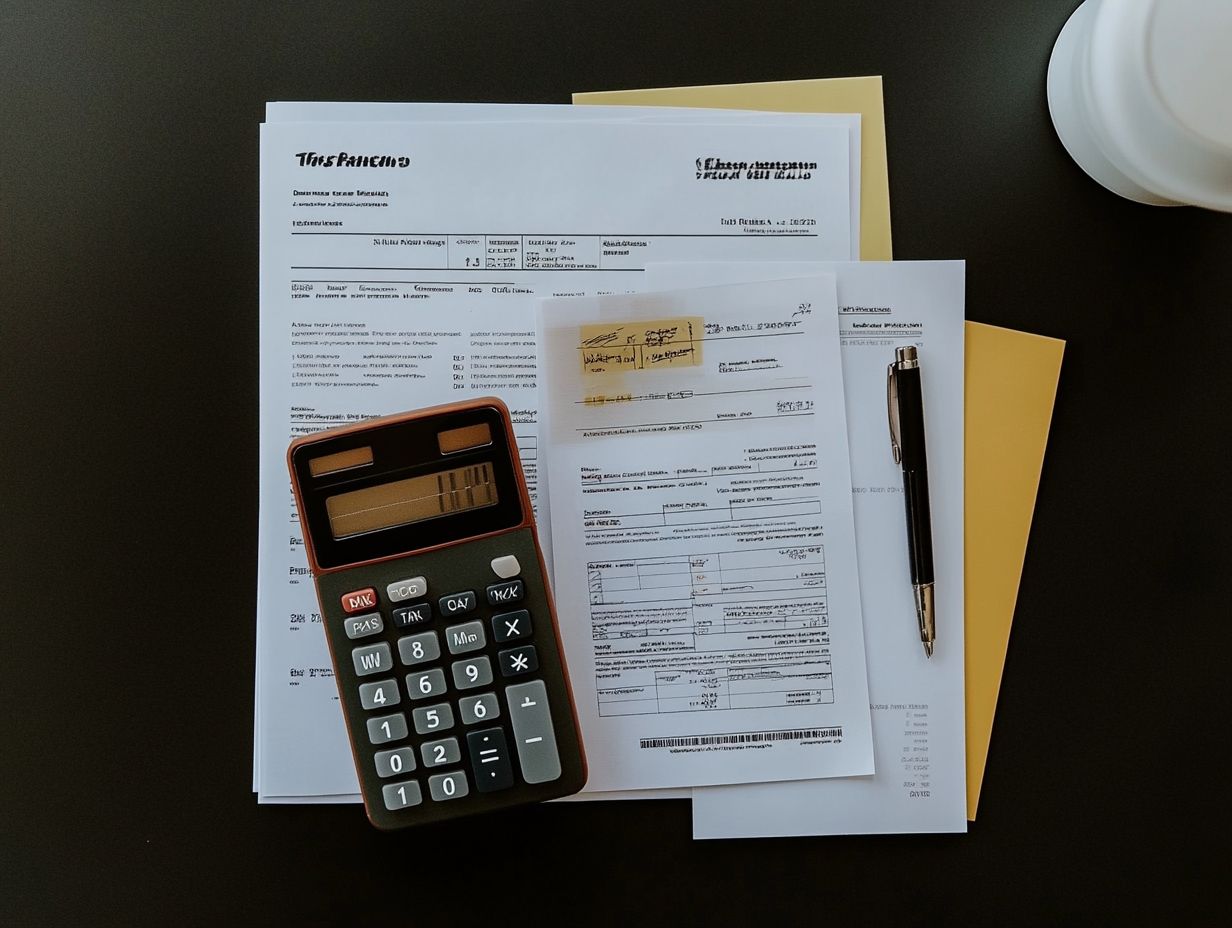
Some essential tax documents that every freelancer should keep include 1099-MISC forms, invoices, receipts, bank statements, and expense logs.
Why is it important for freelancers to keep these tax documents?
These tax documents are important for freelancers because they serve as proof of income, expenses, and deductions for tax purposes. They also help with accurately reporting income and filing taxes.
Where can freelancers obtain 1099-MISC forms?
Freelancers can obtain 1099-MISC forms from their clients or from the IRS website. They can also use accounting software to generate these forms.
What should freelancers do if they are missing a tax document?
If a freelancer is missing a tax document, they should contact the issuer and request a copy. If they cannot obtain the document, they should still report the income or expense and provide an explanation for its absence.
How long should freelancers keep these tax documents?
Freelancers should keep these tax documents for at least three years. However, it is recommended to keep them for longer in case of an audit or if they need to file an amended tax return.
Are there any tools or software that can help freelancers keep track of these tax documents?
Absolutely! Freelancers have fantastic tools at their fingertips to streamline tax tracking.
These tools can help you keep track of important tax documents. Popular options include QuickBooks, which is designed for those who run their own businesses, FreshBooks, and Wave. Don’t wait until tax season; start organizing your documents today!

